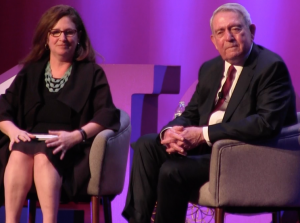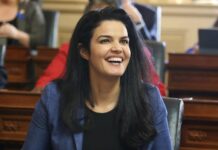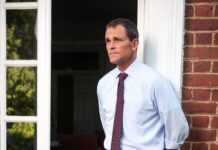At 86 years old, the keynote speaker for this year’s Tom Tom Founders Festival has not changed much since his time as anchor of the CBS Evening News.
Sitting in a small chair on the brightly-lit stage Thursday night with Slate senior editor Dahlia Lithwick, Dan Rather had the same quiet command of the room that he projected every weekday evening for 24 years as an anchor (and 44 as a reporter) for CBS. In the spirit of his most recent book, What Unites Us: Reflections on Patriotism, Rather spoke with Lithwick about some of the biggest issues facing journalism, American freedom, and our collective capacity for human decency and understanding: a concept that, as Rather noted, is threatened by the divisiveness of our day.
As the moderator for last night’s discussion, Lithwick began the conversation by asking Rather if the present moment is the same as other tumultuous times in journalism’s history, directly pointing to attacks on the free press by the current administration. Rather, a reporter who covered the likes of Watergate, 9/11, numerous wars and political campaigns, had no hesitation in offering a markedly foreboding response.
“This is not the same,” he said, resolute in his intense tone. “I think it is very important to understand that what we have been going through and will continue to go through with the new administration in Washington… is something unique not only in journalism history, but in the history of the country. That [sic] we have never had a president – and that includes Richard Nixon – who did mount his own campaign, a rather forceful campaign, against the press… We have never had a president, any president, from the first moment of his presidency, even before, who personally and directly, from his own mouth, from his own direct writing, has opened such a relentless campaign against the whole idea of a free press.”
It is safe to say that no one in the room could possibly be surprised that Rather’s commentary on the utility of maintaining a free press coincided with our nation’s, and particularly our town’s, own struggles with divisive rhetoric.
“Nowhere in history has any people, has any society, tried what we’re trying to do, which is: have a multiracial, multireligious, multiethnic country, which can be united around some core values to hold itself together. Never been tried before,” he said. “Let’s not forget who we are, what we are. Let’s don’t [sic] forget what got us this far, and apply some of those lessons to our deep and abiding problems today.”
Speaking about the horrific days of August 11 and 12 in Charlottesville, Rather made it clear that the ideals of patriotism he discusses in his book should not be conflated with a prominent tenet of nationalism and racism: the prioritization of one country or people above another.
“They’re two different words with two different meanings. And particularly in the context of the historical perspective… the essence of patriotism is humility and understanding that you have a deep and abiding love for the country that you would literally give up your life for the country but you always want to make your country better,” the former anchor explained.
“We know from fairly recent history, extreme economic nationalism led to the Great Depression. And extreme racial nationalism, Aryan nationalism, led to Adolf Hitler,” he continued, “so every authoritarian regime that comes to power anywhere, including our own country, has at its core a desire to confuse the public between patriotism and nationalism for their own benefit.”
In discussing the importance of perspective and truth, especially in regard to a free press committed to seeing through “alternative facts,” moderator Dahlia Lithwick spoke to Rather about the shifting role that real, truly local news serves in our increasingly profit-motivated mediascape.
“We have seen the diminution of everything that has to do with local news,” Lithwick noted, highlighting the lessened attention given to authentic local coverage and the increase in pre-scripted products designed by parent companies to increase profits. “Is there a way to fix what’s rushing in to fill local news?”
“I’m here to preach the gospel of: support your local newspapers,” Rather responded, eliciting applause from the crowd before offering a solution: active political participation.
“Very big business is in bed with very big government in Washington,” he said. “It’s unhealthy for the country to have four to six big companies owning 85% of the true national distribution of news. And that can be reversed. It can be reversed slowly, and it can be reversed if we demand it.”
The two speakers went on to discuss Rather’s own active participation in galvanizing political involvement through his various web platforms, allowing Lithwick to highlight the anchor’s extensive Twitter following and new media projects. She pointed out that, in an age with millennial media consumers so heavily relying on social media for instant information, Rather recently joined the conversation in a post-CBS Evening News capacity and began a production company called “News and Guts.” This new media company is, in a way, a means of allowing Rather to adapt to a new form of 21st century journalism, and it is most certainly an endeavor that he could never pursue while in the anchor seat.
“You’ve segued into this new media, and I think what’s interesting that I want to press on with you is that you have gone from the sort of dispassionate, neutral anchor chair to very forceful, very strong opinions… you’re very clear, I think more clear than almost anyone, about the peril we’re in and you call it that. And when it’s a lie, you say ‘this is a lie,’” Lithwick noted. “And I wonder a little bit whether you wish you had spent your 44 years doing this kind of ‘I’m not neutral, this makes me mad!’ journalism that you do today?”
“Frankly, I wouldn’t do it any differently,” Rather said in his ever-soft, steady voice. “I was lucky as a child. I dreamed always of being a reporter… I was dedicated to both the idea and the ideal. I wanted to be an honest broker of information… Now, others will have to judge, and some of them do judge, how well or poorly I did that, but that’s what I wanted to do.”
—
We also got an inside look at Mr. Rather’s talk with UVa students prior to his appearance at Tom Tom. To see this bonus footage, click on the link below.
















